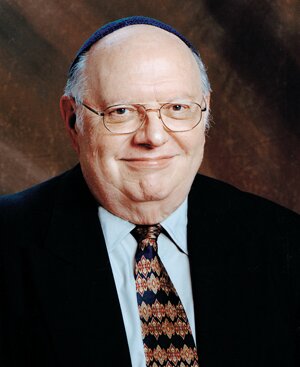| Edwin Epstein on the challenges of providing Jewish education |

|

|
|
In over thirty years in Jewish education, Edwin I. Epstein has continuously raised the standards of excellence for each community he touches. He has founded two Jewish schools and taken two others to the next level of development. At the same time, he maintains a unique atmosphere of warmth and tolerance. His influence on the educational standards of our children will be an essential part of the skills they take with them as they journey to adulthood.
Mr. Epstein has served as the Head of School of Carmel School since August 2001, when he relocated from Santiago, Chile to Hong Kong together with his wife Judith. In Santiago, Chile he founded the Maimonides School. Chile presented the ultimate challenge, to develop a Jewish Day School in a country without a history of Jewish education. He used the same core values in the Chilean community that he utilises in his approach the Hong Kong community. Each new community presents new challenges. In Asia, he recognises the challenges of overseeing a Jewish school in such a diverse community, of encouraging increased parental support in an extremely face-paced and demanding environment, of inspiring increased development and exploration of Judaism in a population that is largely unaffiliated, and of financial constraints limited by a small and somewhat transitory community. In speaking with Mr. Epstein it becomes clear that these challenges are what drive him to personally reach a higher level of excellence and a large part of what makes the ability to provide a Jewish education in the Far East so rewarding. Under the influence of Edwin Epstein and his predecessors, Carmel is truly a trailblazer in Jewish Day School education in the Far East. It has become a model and proof that this can work, even in Asia. There is a constant exchange of ideas and informal assistance provided to other communities in the region. He sees the pivotal responsibility of a Jewish Day School as the empowerment of a new generation of children, especially those without religious affiliations, to be able to make meaningful, informed choices in their own lives. While he does not pass judgment, he truly believes that to not equip these children with basic tools is too deprive them of their right to connect with their people and shared destiny. When asked about the integration of more religious families into the Carmel system and the challenges, Mr. Epstein quotes the philosophy of complete acceptance and inclusion as stressed in the school’s mission statement. He sees the exposure of the Carmel children to diversity in terms of nationality, affiliations and religious background, as a positive that perhaps schools in larger communities, where there are infinite options as to the type of Jewish education available, does not occur. For religious families a move to Hong Kong can be frightening. To an outsider, the Far East is seen as a “desert of religious experience”, removed from the comforts of a large and somewhat insular community. In alignment with the core philosophy of the founding fathers of Carmel, diversity and the policy of inclusion are strengths and mutually beneficial experiences for all children. Exposure and understanding of difference is not merely lectured but lived. Religious children learn to express their Judaism in a more meaningful dialogue and experience personal growth from the ‘multi-cultural’ experience. As far as the possibility of competing religious schools being developed within Hong Kong is concerned, Mr. Epstein would welcome any other institution that is capable of meeting the standards of education required in Hong Kong. He believes that competition takes away complacency and provides the opportunity to share resources and to learn to cooperate. He cautions, however, that it must be done right or not at all; to do less is detrimental to everyone in the community. Top on his wish list for Carmel, Edwin Epstein would like to see the programme expanded to provide education through the 12th grade. There are no plans for immediate expansion but he stresses that there is the need. Expansion would attract more families to Hong Kong and allow younger families, currently within the Carmel system, to look at Hong Kong ‘as their true home’. Inline with this gap, there is also the problem of outreach and Mr. Epstein is also looking into some post-Carmel continuing education possibilities. A task force to setup this type of essential programming is at work. He stresses that age 15 is too young to let these students abandon their Jewish education full-stop. The teenage years are critical years of development. This outreach is seen as the priority in ensuring a solid future for the Carmel family. He also believes that parents need to understand their vital roles as links in the chain. Parental involvement, in general, is a challenge in an environment where travel schedules and work pressures are highly demanding. Building a vibrant community of volunteers and finding financial support are vital aspects to ensure survival. “If no one rose to the occasion and volunteered, we would still be in Egypt.” Also on top of his wish list, is the founding of an adult institute for parental education to expand understanding and knowledge of not only Judaic topics and learning, but to cover topics on parenting and discipline and the increasing demands of raising children in the modern world. Mr. Epstein learned the necessity of this “dual- parent/child curriculum” from his experiences in other communities. A state-of-the art resource room would further these aims. He proudly points to the increased focus on art and culture that Carmel has taken in recent years. They are taking full advantage of all Hong Kong has to offer and are given opportunities to interface directly with world class artists and musicians that have come to share their skills, talents and philosophy with the students. Profound interest is sparked within the students and they challenge themselves to broaden their interests. As for the future of Jewish education in general, Edwin Epstein indicated that it is a “mile wide but one inch deep.” He stressed that this is the time to go back to our original sources and core values, as rigorous study and disciplined learning can’t replaced with the language of mediocrity. Edwin Epstein challenges Carmel students and their parents to recognise that excellence is to be encouraged and education will equip our children to rise to challenges. In speaking with Edwin Epstein, it is clear that he sees Jewish education as our future. He highlights Carmel’s vital role in in nurturing a future generation of Jewish parents and educators. While he points to a ‘dumbing down’ of educational standards over the past twenty years alone, he openly challenges his community to again raise the bar. |

















